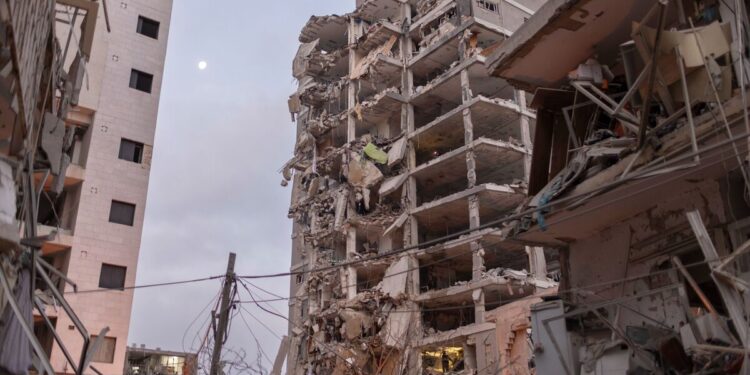 Iran-Israel war: Tensions in the Middle East escalated dangerously on Friday as Iran launched missiles equipped with cluster bombs at Israel, marking the eighth consecutive day of an intensifying conflict between the two regional powers. In a chilling first for the current war, the Israeli military confirmed that at least one Iranian missile dispersed multiple submunitions over central Israel, including the town of Azor, where a residential home was damaged.
Iran-Israel war: Tensions in the Middle East escalated dangerously on Friday as Iran launched missiles equipped with cluster bombs at Israel, marking the eighth consecutive day of an intensifying conflict between the two regional powers. In a chilling first for the current war, the Israeli military confirmed that at least one Iranian missile dispersed multiple submunitions over central Israel, including the town of Azor, where a residential home was damaged.
Cluster Bombs Over Israel: A Grim Turning Point in the War
The use of cluster bombs—controversial weapons banned by over 100 countries—has triggered global outrage and fears of increasing civilian casualties, particularly since many of these submunitions fail to explode upon impact and remain a threat for years.
According to Israeli military sources, the missile warhead split approximately 7 kilometers above ground, scattering over 20 bomblets across an 8-kilometer radius. “The terror regime seeks to harm civilians by using wide-dispersal munitions designed to maximize damage,” said Brigadier General Effie Defrin, spokesperson for the Israel Defense Forces (IDF).
While there have been no reported fatalities from the submunition strike in Azor, the symbolic and psychological impact of this attack is profound. Earlier in the week, Iran also struck a medical building in southern Israel, injuring 71 people and causing widespread panic as civilians rushed to shelters.
Netanyahu’s Vow: “Iran Will Pay the Full Price”
Israeli Prime Minister Benjamin Netanyahu addressed the nation, declaring that Iran would pay “the full price” for attacking Israeli civilians. He added that Israel’s military campaign is ahead of schedule, and that its forces have successfully targeted multiple Iranian nuclear infrastructure sites, including facilities suspected to be part of Tehran’s covert weapons program.
This marks a dangerous new chapter in the Iran-Israel conflict, which shows no signs of de-escalation. Experts warn that the use of cluster munitions—particularly in populated areas—could amount to a war crime under international humanitarian law, although neither Iran nor Israel are signatories of the 2008 Convention on Cluster Munitions.
Daryl Kimball, executive director of the Arms Control Association, condemned the move: “Cluster bombs are egregious weapons with wide-area destruction, especially in civilian-populated regions. Iran knows these weapons are likely to hit non-military targets due to their inaccuracy.”
In a separate development, Iran named Brigadier General Majid Khadami as the new head of intelligence for the Islamic Revolutionary Guards Corps (IRGC), days after an Israeli strike killed his predecessor. The targeted killing of Mohammed Kazemi, along with two other high-ranking IRGC officers, has fueled Tehran’s retaliatory ambitions.
Global Stakes Rise: Trump Weighs U.S. Military Involvement
The conflict has now drawn the attention of global powers. The White House announced that President Donald Trump will decide within two weeks whether to provide military support to Israel. This decision comes amid intelligence suggesting Iran could produce a nuclear weapon within weeks if given the green light by Supreme Leader Ayatollah Ali Khamenei.
Behind closed doors, Trump’s special envoy Steve Witkoff is reportedly holding discreet talks with Iranian officials, while nearly 40 US military aircraft have been repositioned from a base in Qatar—an apparent move to protect American assets from possible Iranian strikes.
Meanwhile, Iran has not only launched missiles but also deployed multiple drone barrages targeting strategic Israeli infrastructure. Israeli air defenses have intercepted most of these drones, but several have caused damage to civilian buildings and military installations alike.
The international community is now watching closely. UN Secretary-General António Guterres urged both sides to exercise restraint and avoid actions that could spark a wider war. However, with no ceasefire in sight, and both Iran and Israel vowing to escalate if provoked, the risk of a full-scale regional war is higher than ever.
As the conflict enters its ninth day, the humanitarian cost continues to rise, and questions mount over the role of external powers in either fueling or defusing the situation. With both sides entrenched and unwilling to compromise, the Middle East once again finds itself on the brink of unprecedented violence.














